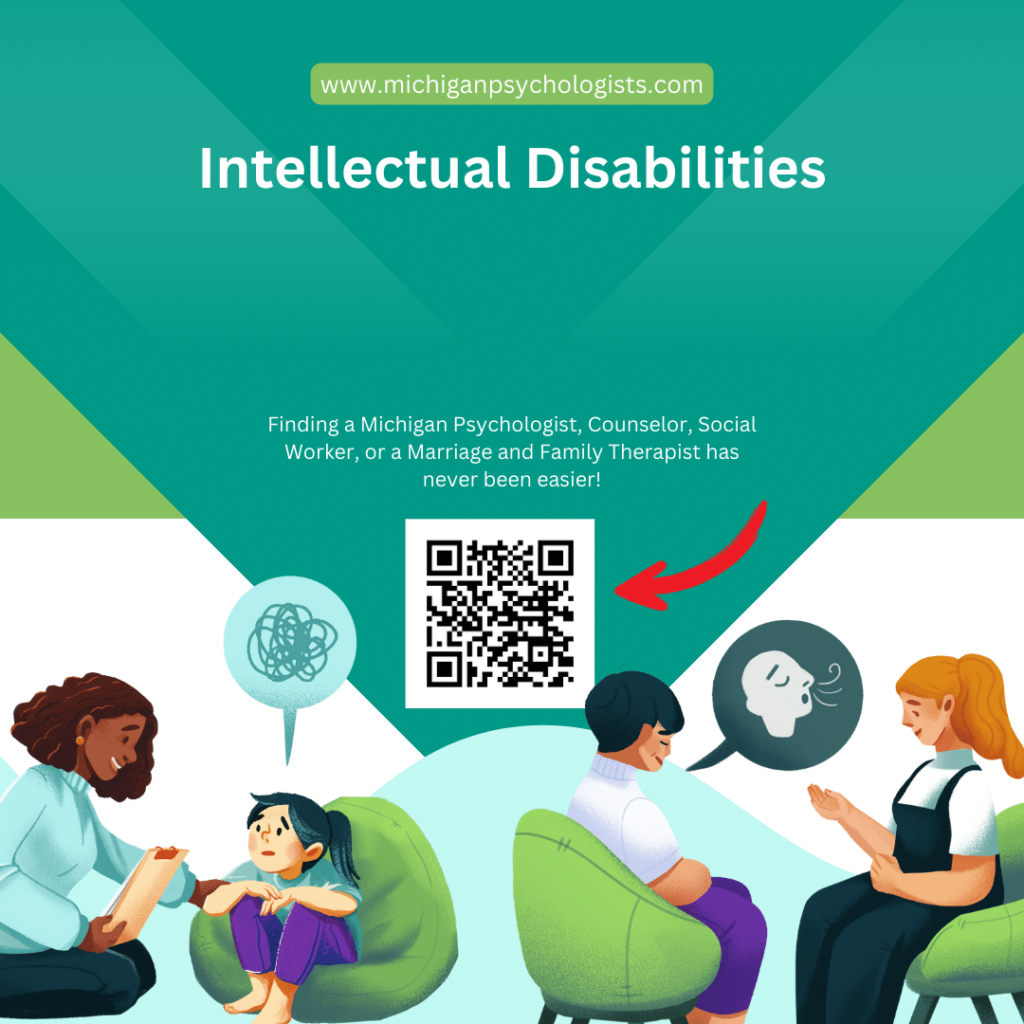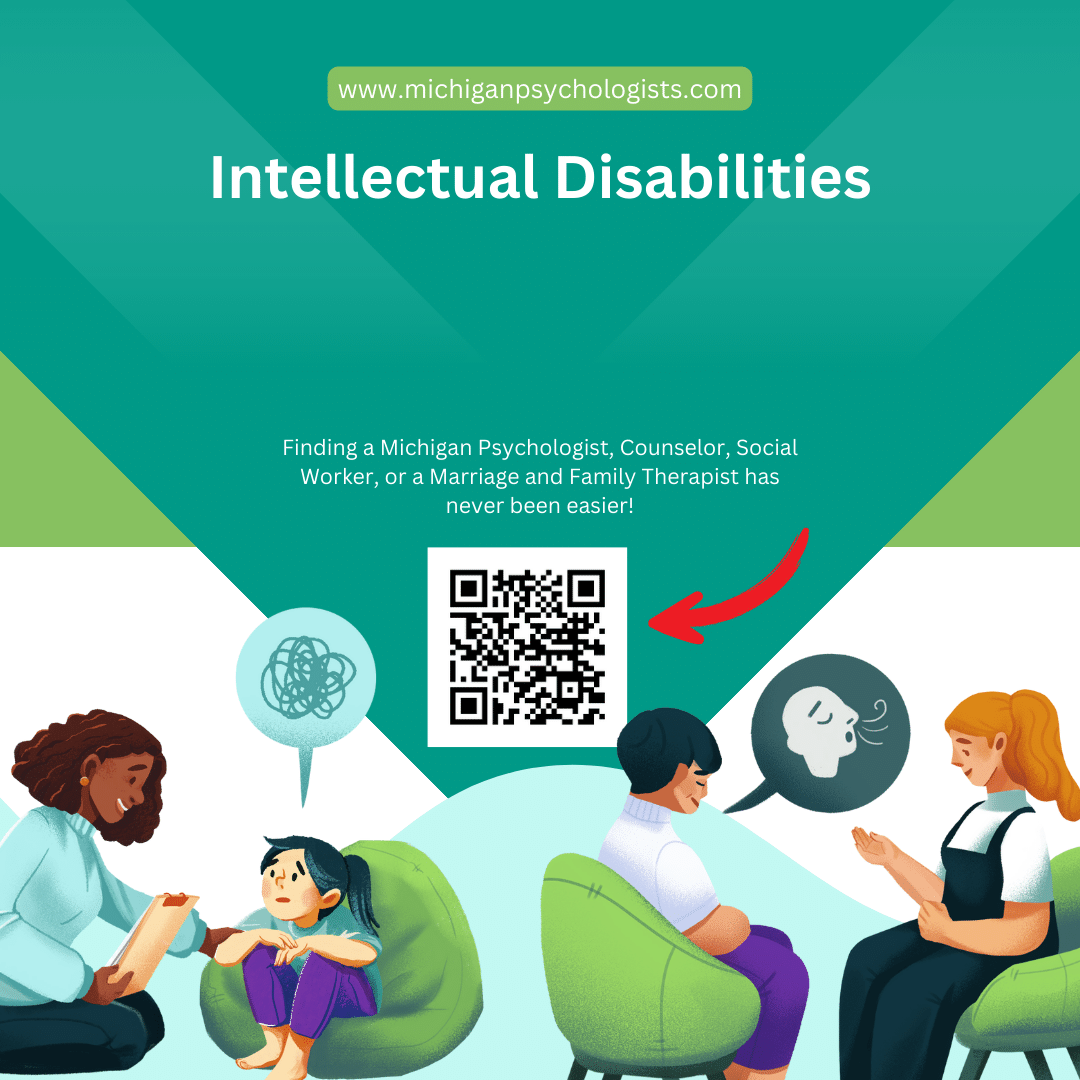Intellectual Disabilities
Home » Guide to DSM-5-TR Mental Health Disorders and Diagnostic Categories » Intellectual Disabilities

Table of Contents
Intellectual Disabilities, also known as Intellectual Developmental Disorder, are characterized by significant limitations in both intellectual functioning and adaptive behavior, originating during the developmental period. These limitations affect an individual’s conceptual, social, and practical skills necessary for everyday life.
Intellectual Disabilities Diagnostic Criteria
Deficits in Intellectual Functioning
Deficits in intellectual functioning include impairments in reasoning, problem-solving, planning, abstract thinking, judgment, academic learning, and learning from experience. These deficits are confirmed through clinical assessment and standardized intelligence testing.
Deficits in Adaptive Functioning
Adaptive functioning deficits result in a failure to meet developmental and sociocultural standards for personal independence and social responsibility. Without ongoing support, these deficits limit functioning in one or more activities of daily life, such as communication, social participation, and independent living, across multiple environments, including home, school, work, and community.
Onset During the Developmental Period
The onset of intellectual and adaptive deficits occurs during the developmental period, typically before the age of 18. This early onset is crucial for the diagnosis and differentiation from other conditions that may present later in life.
Intellectual Disabilities Levels of Severity
Mild Intellectual Disability
Conceptual Domain
Individuals with mild intellectual disability experience difficulties in learning academic skills such as reading, writing, arithmetic, time, or money management. These challenges become apparent in school-age children and continue into adulthood. Adults may need support for complex daily living tasks.
Social Domain
Social interactions are often immature compared to peers. Individuals may have difficulty accurately perceiving social cues and may exhibit concrete communication. They may struggle with social judgment and decision-making, requiring guidance in social settings.
Practical Domain
In the practical domain, individuals may function appropriately in personal care but need support with complex tasks such as healthcare decisions, legal issues, and childcare. Support is necessary to manage these areas effectively.
Moderate Intellectual Disability
Conceptual Domain
Significant delays in language and academic skills are evident, with progress typically remaining at an elementary school level. Individuals require extensive teaching and support to acquire these skills.
Social Domain
Social and communication behaviors differ markedly from peers. Social judgment and decision-making abilities are limited, and friendships are often based on support and assistance from others.
Practical Domain
Considerable support is needed for daily living activities. Individuals can perform personal care activities with significant training but require continuous support to manage more complex tasks.
Severe Intellectual Disability
Conceptual Domain
Individuals with severe intellectual disability have little understanding of written language or concepts involving numbers, quantity, time, and money. Problem-solving in daily life requires ongoing support and supervision.
Social Domain
Spoken language is limited, and social communication is primarily focused on the here-and-now context. Understanding and use of language are restricted, necessitating support in all social interactions.
Practical Domain
Support is required for all activities of daily living, including eating, dressing, bathing, and toileting. Constant supervision and assistance are necessary to ensure safety and well-being.
Profound Intellectual Disability
Conceptual Domain
Conceptual skills are based on the physical world rather than symbolic processes. Individuals may use objects for self-care, work, and recreation but have minimal understanding of abstract concepts.
Social Domain
Communication is largely nonverbal and involves understanding simple instructions or gestures. Social interactions are usually with familiar people, and relationships are formed based on sensory and emotional connections.
Practical Domain
Individuals are dependent on others for all aspects of daily physical care, health, and safety. Participation in activities requires extensive support and supervision.
Associated Features
Coexisting Conditions
Intellectual Disability may be accompanied by other mental, neurodevelopmental, medical, and physical conditions. Common coexisting conditions include anxiety disorders, depressive disorders, and attention-deficit/hyperactivity disorder (ADHD).
Etiology
The causes of Intellectual Disability are varied and can include genetic conditions (such as Down syndrome), prenatal factors (such as fetal alcohol syndrome), perinatal factors (such as birth complications), and postnatal factors (such as lead poisoning or traumatic brain injury).
Assessment and Support
Comprehensive Assessment
Diagnosing Intellectual Disability requires a thorough assessment, including clinical evaluation and standardized testing. It is essential to assess both intellectual and adaptive functioning to determine the appropriate level of support and intervention.
Individualized Support
Support and intervention must be tailored to the individual’s specific needs and strengths. This can include educational support, behavioral therapy, speech and language therapy, occupational therapy, and social skills training.
Life Span Considerations
Intellectual Disability is a lifelong condition, and the level of support and intervention may need to adapt as the individual progresses through different life stages. Continuous assessment and adjustment of support plans are necessary to address changing needs and circumstances.
Intellectual Disability is a complex condition that requires a comprehensive and individualized approach to diagnosis and support. Understanding the levels of severity and the specific needs associated with each level is crucial for providing effective care and improving the quality of life for individuals with Intellectual Disability. Through tailored support and interventions, individuals with Intellectual Disability can achieve greater independence and participate more fully in their communities.
